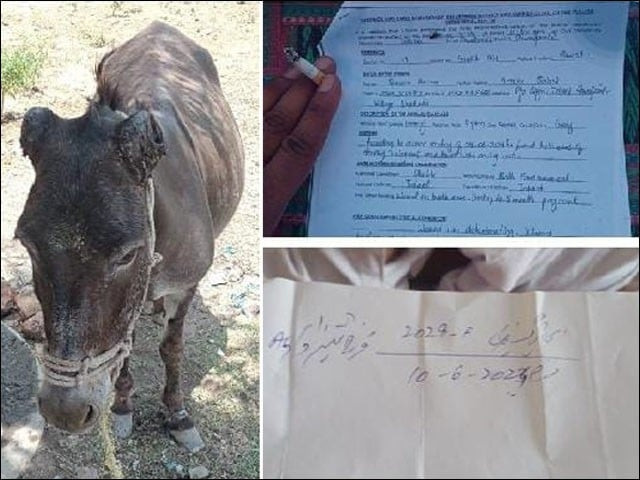In a harrowing incident that marks the second case of severe animal cruelty in the country within a fortnight, a jennet (female donkey) in a village in Rawalpindi district was found with its ears severed. This brutal act has not only shocked the local community but also stirred a national outcry, drawing attention to the deep-seated issues of animal welfare and human violence.
The Incident: A Shocking Discovery
On an otherwise unremarkable morning, villagers in Rawalpindi awoke to a scene of unimaginable cruelty. The jennet, a familiar presence in the community, was discovered with her ears gruesomely severed. The brutality of the act left villagers in disbelief, sparking a mix of outrage, fear, and bewilderment.
This incident comes on the heels of another shocking case in Sanghar, where a camel’s leg was severed by an enraged garden owner. The recurrence of such violent acts against animals in such a short span has raised alarm bells about a possible surge in animal cruelty or a deeper, more systemic issue within rural communities.
Unraveling the Motivations: Beyond the Surface
To understand the gravity and complexity of this incident, it is essential to delve into the potential motivations and underlying issues that might have led to such a barbaric act.
- In rural Pakistan, animals are often integral to the livelihood of villagers. However, economic hardship and social pressures can push individuals to act irrationally. The severing of the jennet’s ears might be a manifestation of pent-up frustration and helplessness, exacerbated by economic challenges. It’s crucial to explore the mental health landscape of these communities to understand how stress can trigger such extreme actions.
- While many rural communities in Pakistan have a deep bond with their animals, there are also cultural practices and beliefs that can sometimes lead to mistreatment. In some cases, harming an animal might be perceived as a form of punishment or retribution. Understanding the cultural narratives around animals and their treatment can provide insights into the roots of such cruelty.
- The recurring incidents underscore a glaring gap in the legal framework and enforcement of animal rights in Pakistan. Despite the existence of laws against animal cruelty, enforcement is often lax, and penalties are minimal. This creates an environment where such acts can occur with impunity. The severing of the jennet’s ears should catalyze a broader discussion on strengthening and enforcing animal protection laws.
The Community’s Response: A Spectrum of Reactions
The incident has elicited a range of responses from the local community and beyond. Animal rights activists have been quick to condemn the act, calling for immediate and stringent action against the perpetrators. They argue that such acts of cruelty are indicative of broader societal issues and must be addressed with urgency and seriousness.
Local leaders and villagers, while equally horrified, are caught in a dilemma. There is a palpable tension between the desire to uphold traditional values and practices and the need to adapt to modern ethical standards. This incident has sparked intense debates about the place of animals in rural life and the ethical obligations of humans towards them.
National Implications and the Way Forward
The severing of the jennet’s ears is not an isolated incident but part of a troubling pattern that has significant national implications. It highlights the need for a comprehensive approach to animal welfare that includes legal reform, community education, and mental health support.
- There is an urgent need to revisit and reinforce animal cruelty laws in Pakistan. This includes not only harsher penalties for offenders but also better mechanisms for reporting and addressing animal abuse.
- Educating communities about the ethical treatment of animals and the legal consequences of cruelty can play a pivotal role in preventing such incidents. This involves integrating animal welfare education into school curriculums and community programs.
- Providing mental health support and resources in rural areas can help address the underlying psychological issues that may lead to violent acts against animals. This includes establishing counseling services and support groups for individuals dealing with economic and social stress.
A Call for Compassion and Action
The severing of the jennet’s ears in Rawalpindi is a grim reminder of the darker aspects of human-animal interactions and the urgent need for systemic change. As Pakistan grapples with these incidents, it must confront the complexities of cultural practices, economic pressures, and legal shortcomings. Through comprehensive legal reform, community education, and mental health support, there is hope for a future where such acts of cruelty become a thing of the past. This incident serves as a clarion call for compassion, understanding, and decisive action to protect the voiceless and vulnerable members of our society.











